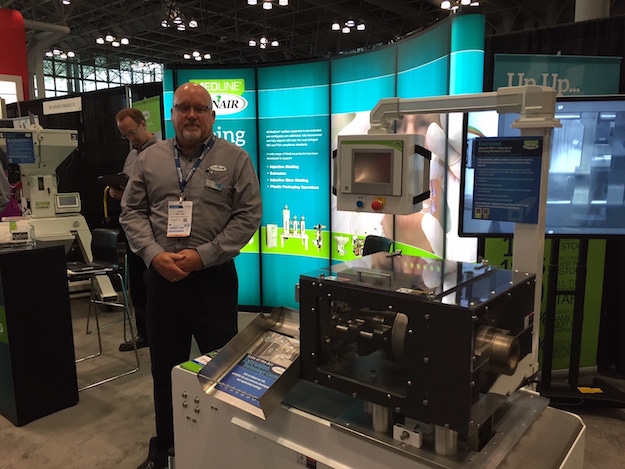The traveling planetary cutter from Conair features a programmable, servo-driven cutting head that cuts small-diameter medical plastic tubing so precisely that the need for secondary, off-line tube finishing is virtually eliminated.
June 16, 2017

A new traveling planetary cutter (M-TPC) from Conair (Cranberry Township, PA), which had its debut at PLASTEC East this week in New York, NY, features a fully-programmable, servo-driven cutting head that cuts small-diameter medical plastic tubing so precisely that the need for secondary, off-line finishing operations are virtually eliminated. “The elimination of secondary processing can save customers as much as 60%,” Bob Yore, Product Manager, Downstream Extrusion, told PlasticsToday from the show floor.
|
Pictured are Conair's Bob Yore and his "baby," the new traveling planetary cutter (M-TPC), which debuted at the co-located MD&M East and PLASTEC East show this week. |
Unlike other cutters that can leave behind particulates, the M-TPC cleanly splits apart the tubing via displacement, without any material loss. The planetary knife spins around the circumference of tubing, never blocking airflow through the center of the tube. Consequently, tube sizing and ovality are not affected. The programmable cutting head enables complete and precise control of cutter speed (surface speed), rate of cutter penetration (feed speed) and final depth of the cut. The system is suitable for tubing with outer diameters measuring between 0.080 and 1 inch.
The equipment's three-axis servo movement is patented. “We filed the patent application just one week before bringing the M-TPC here to the show,” said Yore.
“Most rigid medical tubing today is cut-to-length using rotary or fly-knife cutters,” explained Bob Bessemer, Medical Downstream Extrusion Sales Manager for Conair, in a prepared statement. “The results have been mixed," he added. Even with close-fitting cutter bushings and good blade technology, it is sometimes difficult to obtain a square, distortion-free/particulate-free cut on the extrusion line. When a rotary knife impacts a rigid tube, the tube is slightly flattened until the blade actually penetrates the tubing, and this can affect ovality and edge squareness at the cut site.” Other undesirable effects may include scratching, angel hairs or agglomeration. “Depending on the fit and function required for the application, these flaws may be unacceptable. In that case, tubing needs to be cut oversized on-line and then re-cut off-line, by hand, to finish the part,” explained Bessemer.
The planetary cutter is mounted on a precision, servo-driven traveling table that can automatically handle tubing at line speeds up to 100 ft/minute. The standard servo controls enable distortion-free and particulate-free cuts at rates up to 45 per minute while holding cut-to-length tolerances of ±0.031 inches, even on shorter lengths of tubing. The cutter can be used with the full range of medical plastic tubing, including difficult-to-cut materials such as styrene, PET, HIPS and PC.
A front-mounted touchscreen enables operators to set table travel velocity, tubing size, blade velocity and cutting depth. Once created, specific cutting programs can be stored in on-board memory for easy recall and re-use. The cutter is engineered to allow for quick blade changes without the need to remove product from the machine, so the need to stop and restart the line for blade replacement is eliminated.
Yore was first prompted to consider designing a planetary cutter of this sort through conversations with a Conair customer, who wondered if there was a way to eliminate burs in cut medical tubing. Conair applied its expertise in plastics processing auxiliary equipment to find a solution. The M-TPC ran in test mode for almost a year prior to its unveiling at PLASTEC East. “The cutter is suitable for any number of applications,” said Yore, adding that right now medical manufacturers have shown the greatest interest.
About the Author(s)
You May Also Like





